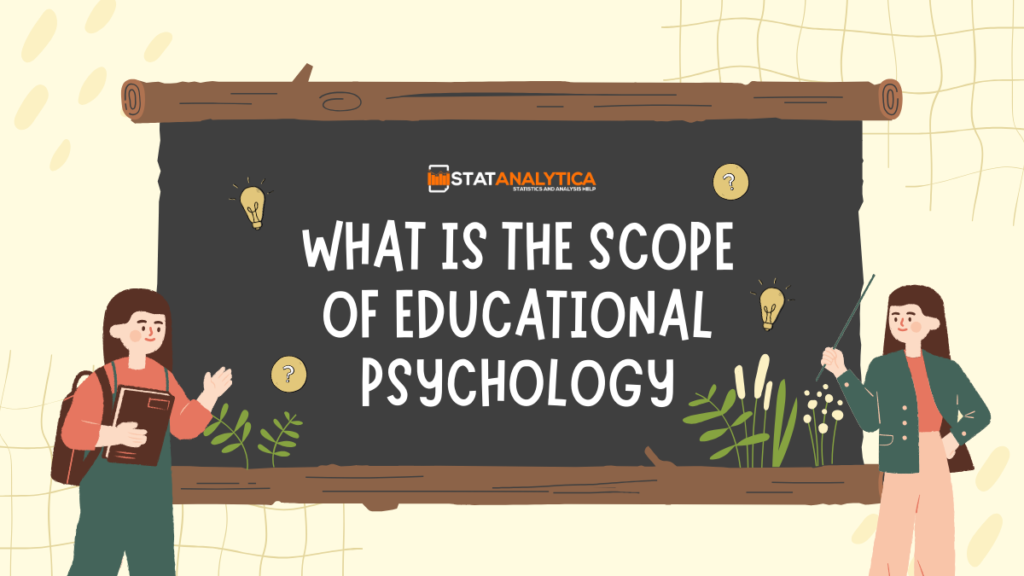Educational psychology might sound like a complex term, but it’s essentially about understanding how people learn and develop within educational settings. In this blog, we’ll take a journey through the vast landscape of what is the scope of educational psychology and explore its significance in shaping teaching practices and learning outcomes.

Historical Overview of Educational Psychology
Table of Contents
Educational psychology has deep roots, stretching back to the late 19th century. It emerged as psychologists sought to apply their understanding of human behavior to educational settings.
Thinkers like John Dewey and Jean Piaget played pivotal roles in shaping the early theories of educational psychology, laying the foundation for understanding how students learn and grow.
What Is The Scope Of Educational Psychology?
- Understanding Learning Processes
- Educational psychology examines how individuals acquire knowledge and skills within educational settings.
- Example: Studying various learning theories such as behaviorism, cognitivism, and constructivism to understand how students process information.
- Exploring Developmental Milestones
- Educational psychology investigates the physical, cognitive, and socio-emotional development of learners.
- Example: Identifying the stages of cognitive development proposed by Jean Piaget and applying them to curriculum design.
- Examining Motivation and Engagement
- Educational psychology delves into factors that influence students’ motivation and engagement in learning.
- Example: Investigating the impact of intrinsic and extrinsic motivation on student performance and behavior.
- Addressing Individual Differences
- Educational psychology considers the diverse needs and abilities of learners, including learning styles and special educational needs.
- Example: Implementing differentiated instruction strategies to accommodate students with varying learning preferences and abilities.
- Enhancing Teaching Practices
- Educational psychology provides insights into effective teaching strategies and classroom management techniques.
- Example: Using behavioral principles to establish clear expectations and reinforcement systems for desired behaviors in the classroom.
- Assessing Learning Outcomes
- Educational psychology informs the design and implementation of assessment methods to evaluate students’ understanding and progress.
- Example: Utilizing formative assessments such as quizzes and exit tickets to monitor student learning throughout a lesson or unit.
- Applying Research to Educational Interventions
- Educational psychology research informs the development and implementation of evidence-based interventions to support struggling learners.
- Example: Implementing a phonics-based reading intervention program for students who are experiencing difficulties in acquiring literacy skills.
- Integrating Technology in Education
- Educational psychology explores the effective integration of educational technology and multimedia resources to enhance learning experiences.
- Example: Using interactive educational apps or virtual simulations to engage students in hands-on learning activities.
- Promoting Positive Learning Environments
- Educational psychology emphasizes the importance of creating supportive and inclusive learning environments that foster student success.
- Example: Implementing strategies to promote positive peer relationships and social-emotional learning skills within the classroom.
- Contributing to Continuous Improvement in Education
- Educational psychology contributes to ongoing efforts to improve teaching practices, curriculum development, and educational policies.
- Example: Conducting research on the effectiveness of various instructional strategies and sharing findings with educators to inform their professional development.
What Are Characteristics Of Educational Psychology?
Interdisciplinary Nature
Educational psychology draws from various disciplines such as psychology, education, sociology, and neuroscience to understand the complexities of learning and teaching.
Focus on Learning and Development
It centers on the study of how individuals learn, develop, and acquire knowledge and skills within educational contexts.
Applied Orientation
Educational psychology emphasizes the application of psychological principles and theories to address practical issues and challenges in education, such as instructional design and classroom management.
Individual Differences
It recognizes and addresses the diverse needs, abilities, and backgrounds of learners, including factors such as learning styles, intelligence, and socio-cultural influences.
Scientific Approach
Educational psychology relies on systematic research methods and empirical evidence to study learning processes, developmental milestones, and effective teaching practices.
Developmental Perspective
It adopts a developmental perspective, examining how individuals grow and change over time from infancy through adulthood and how these developmental stages impact learning and behavior.
Contextual Understanding
Educational psychology considers the influence of environmental, social, cultural, and institutional factors on teaching and learning, recognizing that educational experiences are shaped by multiple contexts.
Practical Application
It focuses on providing practical insights and strategies that educators and practitioners can use to improve teaching effectiveness, enhance learning outcomes, and promote positive educational experiences.
Continuous Improvement
Educational psychology emphasizes ongoing reflection, evaluation, and refinement of educational practices based on research findings and evidence-based approaches.
Collaboration and Communication
It encourages collaboration and communication among educators, researchers, policymakers, and other stakeholders to foster innovation, share best practices, and address educational challenges effectively.
What Is The Meaning, Definition, And Scope Of Education In Special Education?
Meaning of Special Education
Special education means the special classes and help students with disabilities get into school. This includes extra teaching that’s just for them, changes in how they learn, and extra support to help them do their best. It’s all about making sure each student with special needs gets the right help they need to learn well.
Definition of Special Education
Special education is a specialized branch of education that aims to provide students with disabilities or special needs access to appropriate educational opportunities, resources, and support services to help them achieve academic success, develop essential skills, and participate fully in school and community life.
Scope of Special Education
- Identification and Assessment
Special education involves the identification, assessment, and evaluation of students with disabilities to determine their individual learning needs and eligibility for special education services.
- Individualized Education Planning
It includes the development and implementation of Individualized Education Programs (IEPs) or Individualized Education Plans (IEPs) for students with disabilities, outlining specific instructional goals, accommodations, and support services tailored to each student’s unique needs.
- Differentiated Instruction
Special education encompasses the use of differentiated instructional strategies and teaching techniques to accommodate diverse learning styles, preferences, and abilities among students with disabilities.
- Support Services
It provides access to a range of support services and interventions, including specialized instruction, assistive technology, speech and language therapy, occupational therapy, and counseling, to address students’ academic, social, emotional, and physical needs.
- Inclusive Education
Special education promotes inclusive education practices that foster the full participation and integration of students with disabilities into general education classrooms and school settings, promoting collaboration, acceptance, and diversity.
- Transition Planning
It involves the development of transition plans and services to support students with disabilities as they transition from school to post-secondary education, employment, independent living, and community participation.
- Collaboration and Advocacy
Special education encourages collaboration among educators, parents, caregivers, and community stakeholders to advocate for the rights and needs of students with disabilities, promote inclusive practices, and ensure equitable access to educational opportunities.
- Legal and Ethical Considerations
It adheres to legal mandates, regulations, and ethical guidelines governing the provision of special education services, including the Individuals with Disabilities Education Act
- Professional Development
Special education provides opportunities for professional development and training for educators, administrators, and support staff to enhance their knowledge, skills, and competencies in serving students with disabilities effectively.
- Continuous Improvement
It involves ongoing assessment, evaluation, and reflection on special education practices and outcomes to identify areas for improvement, promote evidence-based interventions, and ensure the continuous enhancement of educational services for students with disabilities.
Conclusion
Educational psychology encompasses a broad and dynamic array of concepts, theories, and applications. By understanding what is the scope of educational psychology and its significance, educators can enhance their teaching practices and create more meaningful learning experiences for students.
As we look to the future, educational psychology will continue to play a vital role in shaping the landscape of education, driving innovation and improvement in teaching and learning.


